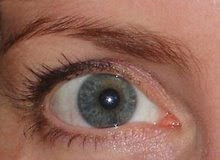Today I started - and finished - reading
My Stroke of Insight by Jill Bolte Taylor. This book was recommended by a psychiatrist (not
mine; I don't have one, although I probably should) so I figured it was going to be worth reading, and it was. I guess I was most engaged by the beginning chapters that outlined what happened to the author while she was experiencing a stroke, how while she should have been calling 911 she was puttering around her apartment musing over the pain in the head, the dead right arm, and the growing sense of detachment from the world.
Last summer I had a migraine headache that mimicked a stroke, except for the pain. But migraine headaches have never brought me much pain. They mess with my vision first, so I notice pieces missing from my field of view, especially in the centre. People and animals suddenly appear nose-less, with a sparkly aura around their edges. And I become detached from my body, where I can see my hands moving but cannot feel myself as being connected to those movements, as though I am watching someone else do things. These have always been my experiences with migraines, which I only have rarely anyway, but because they are the same every time they no longer alarm me. They just
notify me.
However, in the summer I also briefly lost access to some of my memory banks for the first time, and this was a strange feeling. I was watching television when I noticed that the television personalities had lost the middle of their faces, but then I tried to remember what I was watching and I could not remember the names of the people. (It was Oprah or Kelly Rippa or someone I would normally have no trouble identifying.) And I remember being concerned about the fact that I could not remember the name of the host of the show, nor the guest being interviewed, both of whom I should have known easily. I remember wondering if I could be having a stroke. And then I started looking around the room trying to name the things I was looking at: coffee table, television, fireplace, lamp, etcetera, and none of that would come either.
That's when I started talking out loud to myself because I was testing my ability to speak. That worked. I could make words (unlike the author of the book I just read who also lost her speech centre). I sat down on the couch and closed my eyes and rested for a short while, feeling that I was not having a stroke after all, and my ability to think of words came back. Quickly really, although it seemed slow. Five minutes without your words feels like a very long time when you are as rooted in language as I feel I am.
And by the time it ended I wasn't really upset or worried, just bemused, and when the sensation passed I spent some time looking up information about migraines and found that it wasn't terribly uncommon for a migraine to cause a person to experience aphasia.
Anyway. How would I ever know the difference between this experience and a real stroke? I have no idea. The author of the book wrote about feeling rather peaceful and relaxed while her head was exploding. This was simultaneously terrifying and soothing.
The point of the book, of course, was not about the warning signs of stroke - although I learned a lot about this. In the following chapters, the book was more about the right and left brain hemispheres and how they dominate our thoughts, feelings, and actions. Right brain dominance, apparently, can result in more feelings of inner peace and oneness with the universe. Interesting. The author chose to recover parts of her left brain, but not the parts that allowed her to indulge in negative thoughts, fear, anguish, and suffering. There were a number of suggestions for
awakening and stimulating the right brain that were reminiscent of counselling practices.
There are some things I have always done. For example, what I came to learn was called
positive self-talk by therapists
, is something I have always employed my whole life. I think of it as the invisible coach who blows a whistle at me to get me out of bed in the mornings and tells me to get my shit together because
I can do this even if I don't really want to. The invisible coach also counts my minutes on the treadmill and tells me to keep going when I think about cheating. And those self-soothing practices, like candles and baths and music and deep thought.
The book also reminded me a bit of
The Burning House (Jay Ingram), at least at the beginning, because it really left me breathless contemplating the mysteries and the amazing capacities of the human brain.
This kind of thing, when I really
think about it, feels like touching God.
*








